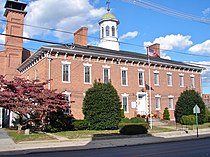Chambersburg, Pennsylvania
| Chambersburg, Pennsylvania | |
|---|---|
| Borough | |
| Borough of Chambersburg | |

Memorial Square in downtown Chambersburg
|
|
| Coordinates: 39°56′15″N 77°39′40″W / 39.93750°N 77.66111°WCoordinates: 39°56′15″N 77°39′40″W / 39.93750°N 77.66111°W | |
| Country | United States |
| State | Pennsylvania |
| County | Franklin County |
| Founded | 1734 |
| Incorporated | March 21, 1803 |
| Government | |
| • Mayor | Darren Brown |
| Area | |
| • Borough | 6.9 sq mi (17.7 km2) |
| • Land | 6.9 sq mi (17.7 km2) |
| • Water | 0.0 sq mi (0.0 km2) |
| Elevation | 630 ft (192 m) |
| Population (2010)Urban as of 2000 census | |
| • Borough | 20,268 |
| • Density | 2,652.5/sq mi (1,034.0/km2) |
| • Urban | 52,273 |
| • Metro | 149,618 (Micropolitan area) |
| Time zone | EST (UTC-5) |
| • Summer (DST) | EDT (UTC-4) |
| ZIP codes | 17201, 17202 |
| Area code(s) | 717 |
| Website | Official website |
 |
|
|
|
Chambersburg is a borough in the South Central region of Pennsylvania, United States. It is 13 miles (21 km) miles north of Maryland and the Mason-Dixon line and 52 miles (84 km) southwest of Harrisburg in the Cumberland Valley, which is part of the Great Appalachian Valley. Chambersburg is the county seat of Franklin County. According to the United States Census Bureau the 2010 population was 20,268. When combined with the surrounding Greene, Hamilton, and Guilford Townships, the population of Greater Chambersburg is 52,273. Chambersburg is at the core of the Chambersburg, PA Micropolitan Statistical Area which includes surrounding Franklin County. The population of the Chambersburg Micropolitan Area in 2010 was 149,618.
Chambersburg's settlement began in 1730 when water mills were built at the confluence of Conococheague Creek and Falling Spring Creek that now run through the center of the town. Its history includes episodes relating to the French and Indian War, the Whiskey Rebellion, John Brown's raid on Harpers Ferry, and the American Civil War. The borough was the only major northern community burned down by Confederate forces during the war.
...
Wikipedia
